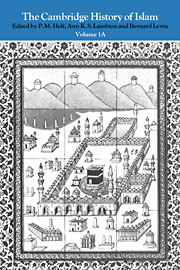Book contents
- Frontmatter
- Introduction
- Part I The rise and domination of the Arabs
- Part II The coming of the steppe peoples
- Part III The central Islamic lands in the Ottoman period
- 1 The rise of the Ottoman empire
- 2 The heyday and decline of the Ottoman empire
- 3 The later Ottoman empire in Rumelia and Anatolia
- 4 The later Ottoman empire in Egypt and the fertile crescent
- 5 Safavid Persia
- 6 Persia: the breakdown of society
- 7 Central Asia from the sixteenth century to the Russian conquests
- Appendix The Golden Horde and its successors
- 8 Tsarist Russia and the Muslims of central Asia
- References
1 - The rise of the Ottoman empire
from Part III - The central Islamic lands in the Ottoman period
Published online by Cambridge University Press: 28 March 2008
- Frontmatter
- Introduction
- Part I The rise and domination of the Arabs
- Part II The coming of the steppe peoples
- Part III The central Islamic lands in the Ottoman period
- 1 The rise of the Ottoman empire
- 2 The heyday and decline of the Ottoman empire
- 3 The later Ottoman empire in Rumelia and Anatolia
- 4 The later Ottoman empire in Egypt and the fertile crescent
- 5 Safavid Persia
- 6 Persia: the breakdown of society
- 7 Central Asia from the sixteenth century to the Russian conquests
- Appendix The Golden Horde and its successors
- 8 Tsarist Russia and the Muslims of central Asia
- References
Summary
Sultan Mehmed the Conqueror
Imperial expansion
Two independent sources report that Mehmed II made the following points at the meeting which decided to proceed with the conquest of Constantinople: ‘The ghazā is our basic duty, as it was in the case of our fathers. Constantinople, situated as it is in the middle of our dominions, protects the enemies of our state and incites them against us. The conquest of this city is, therefore, essential to the future and the safety of the Ottoman state’. These words reaffirmed the policy of conquest pursued by Bāyezīd. They drew attention to cases when the Byzantine empire had given refuge to claimants to the Ottoman throne, thus causing frequent civil wars. They also showed that it was the Byzantine empire which had been the main instigator of crusades. It was also within the bounds of possibility that Constantinople could be surrendered to Western Catholics, as Salonica had been. This would have meant that the Ottoman empire would never be fully integrated. In brief, the conquest of Constantinople was a matter of vital concern to the Ottomans.
The siege of Constantinople lasted for fifty-four days (25 Rabī‘ I-20 Jumādā I 857/6 April-29 May 1453). In the Turkish camp Chandarli continued to draw attention to the great danger of provoking the Western Christian world, and to advocate a compromise. Zaganuz Pasha argued against this that the Ottomans' adversaries could never unite, and that even if an army were sent from the West, Ottoman forces would prove superior, but that, more probably, the city could be captured before the arrival of assistance from Italy.
- Type
- Chapter
- Information
- The Cambridge History of Islam , pp. 293 - 323Publisher: Cambridge University PressPrint publication year: 1977
References
- 3
- Cited by



